
Discover Your Ancestors
Two critically acclaimed publications are available to family history researchers - the annual print magazine, Discover Your Ancestors, and the monthly online magazine, Discover Your Ancestors Periodical. Click here to subscribe.Use your free Gold subscription
Nick Thorne explains how to get the most out of your fantastic free three-month subscription to TheGenealogist
To use your free three-month Gold subscription to TheGenealogist go to www.thegenealogist.co.uk/DYAG16 and fill in your details – you will need the special code from the back of your DVD wallet. You will receive an email confirming your subscription with a password. Now you are free to explore the fantastic resources of TheGenealogist that encompass such essentials for the researcher as the birth, marriage and death indexes (BMDs), parish records, wills, the English and Welsh census from 1841-1911, overseas BMDs, landowner records, an image archive and a comprehensive collection of military records. For those who are new to family history there is a helpful guide, once you have logged in, at www.thegenealogist.co.uk/ researchguide/, or you can view our video tutorials at www.youtube.com/ thegenealogistuk.
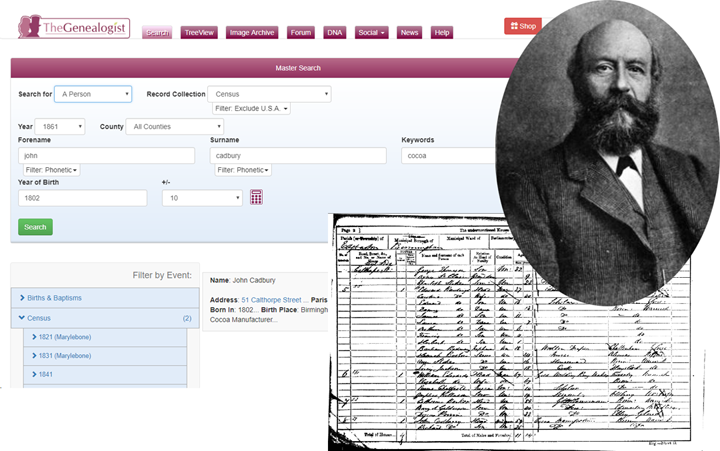
History of John Cadbury
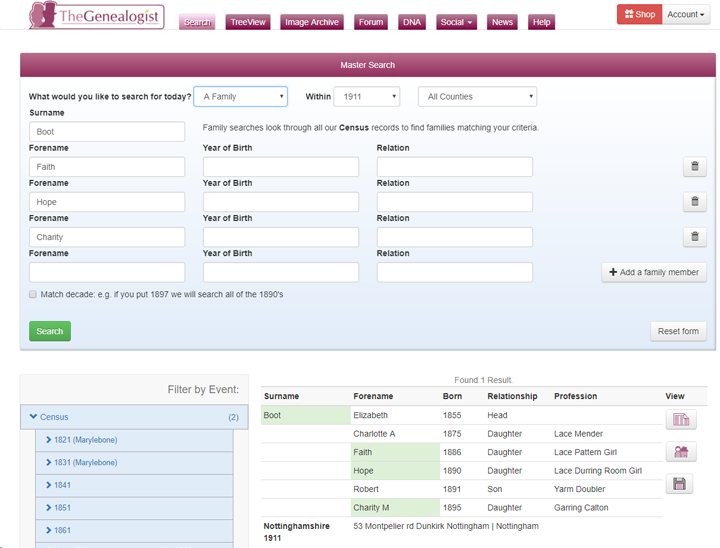
Researching hard to find ancestors
As the number of online records continues to increase it is easier than ever to find our ancestors; but discovering forebears in the documents will depend on the approach that we use and the flexibility of the search tools available to us. Usually the best option is to work backwards from your direct relatives by researching the details of their births marriages and deaths. Ordering the certificates from the General Register Office (GRO) will give you details of addresses, occupations and maiden names. To discover particulars of a parent or grandparent use the Master Search to look for them throughout the record sets on TheGenealogist. You will probably only have a limited amount of information to work with when starting to look for a person. The best strategy to use is to enter broad details into the search fields and then, if the number of results returned is vast, simply use keywords such as the county, occupation and so on to refine. Once you are searching for ancestors in the period from 1841 to 1911, the census is a vital tool. This gives you the names of the whole family and their occupations.
Using the census
Let us look for John Cadbury, the founder of the chocolate company of the same name, though he was originally a tea merchant. If we have few details about the person we are searching for, but do at least know their first name and surname and that they were living in England or Wales around the time of the 1861 census, we can use this collection to find them and their household. Doing this for one of our own ancestors could unlock even more information for us to add into our family tree. Using the Master Search we should select ‘A person’ and change the next drop down menu to read ‘within census’ and in this case select ‘1861’ and then the ‘All counties’ option.Entering the forename and surname into the person search, we could use the words ‘cocoa manufacturer’ in the Keyword field to refine the results. The keyword can be anything that appears on the record and so we could put in this box such details as the place, the occupation, reference number and so on for the subject. TheGenealogist returns one result and you can now select to see a transcript which will give you the names of the others in his household, as listed in the return. With a single click we see the image of the actual page for Calthorpe Street in Edgbaston. Using the transcript result we are able to note his age and that of his children, but his wife is missing from this count and so we could go on to research in earlier censuses to find out her name. On the transcript page there is an icon of a child in arms against the children and grandchildren. With one click you can access the powerful SmartSearch that will look for potential births in the vital records of the GRO for England and Wales, for those born after 1837 when civil registration began. Looking for the births of the Cadbury children we can see that all, apart from the eldest son Richard, were registered after this important date.
Know where your ancestor was born?
If you know where your ancestor was born, and want to obtain a copy of their birth certificate to gain the extra details these supply, then use the powerful Master Search to find the birth after 1837. Enter their name and in the keyword box use their birth county. From the results returned you can now order the birth certificate from the GRO using the page and volume details supplied. Many of our ancestors, like the Cadburys who were Quakers, left the established church – some for a short period and some for good. If your ancestor was a dissenter, then the Nonconformist BMDs can be included in the search. These records go back to the mid-1600s when various groups refused to conform to the Church of England and wished to have religious freedom to worship in their own way. These groups include Presbyterians, Congregationalists, Baptists, Quakers, Methodists, Catholics and Unitarians.
If you know the forenames
Ancestors with common surnames, such as Smith, are difficult to find in the census. If you only have the forenames of a family group to use, then to some of the online resources this is going to pose a challenge – but not for the Master Search on this site. TheGenealogist allows you to find a family group in the census by just using the first names. The Master Search will match the forenames you enter and return family groups that include your choices.
The street where they lived
You may know that your ancestors lived in a particular street, or you want to find out who lived at a specific address at the time of the census. The facility on TheGenealogist to do an address search is an invaluable aid for family historians. You can chose to search for a street name from within the censuses from 1841 to 1911 without entering a name of a person. This can help if the enumerator misspelled your ancestor’s name and you have been unable to find them in the normal way. Maybe you know the names of an ancestor and their dwelling. Take the example of Spade House built in Folkestone by HG Wells for his family. You can find this famous author’s details on the census. To do this make use of the Keyword field on TheGenealogist's Master Search entering ‘Wells’ in the Surname box, and ‘Spade House’ in the Keyword box.
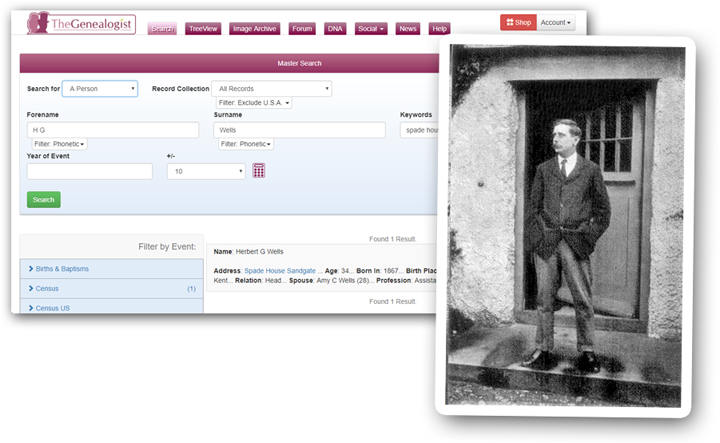
H G Wells, found via the name of his home, Spade House. Right: Wells outside the front door of Spade House in 1908
Name variations
There may also be occasions when you are not sure of the spelling of an ancestor’s surname. Perhaps the family decided to change the spelling of their surname to anglicise a name that had foreign roots and so they have been recorded by this new name in the census. Some ancestors may have changed their surname in order to inherit from another branch of the family. Others may have relied on the enumerator to have written their name down correctly and this official noted it down as he thought that he had heard it, perhaps using spelling that we have not considered. The Master Search on TheGenealogist website can help you to get beyond these pitfalls. You can filter the name phonetically and this tool will match different spellings for a way a name is pronounced, such as Horn/Horne/Hawn. If you only have an initial then using the ‘Standard’ setting will match different combinations of the names and also looks for records that contain only initials; so a search for John Smith will also give results for J Smith as well. Using Keywords and Master Search, together with the phonetic filter if need be, can be your easiest way into finding those elusive ancestors. Finding your ancestors can often depend on adopting a bit of lateral thinking and using a powerful search tool that allows you to dig deep into the information recorded on the original documents. In this article we have exclusively used the Master Search available to Gold subscribers and above from TheGenealogist website as it allows us to drill down into the records in so many useful ways. You can try all of these techniques with your free three month subscription!

IN FOCUS:THE 1911 CENSUS
Your free three-month Gold subscription to TheGenealogist.co.uk includes access to the 1911 census, the most detailed available. Here’s how to find someone in it and connect to other records
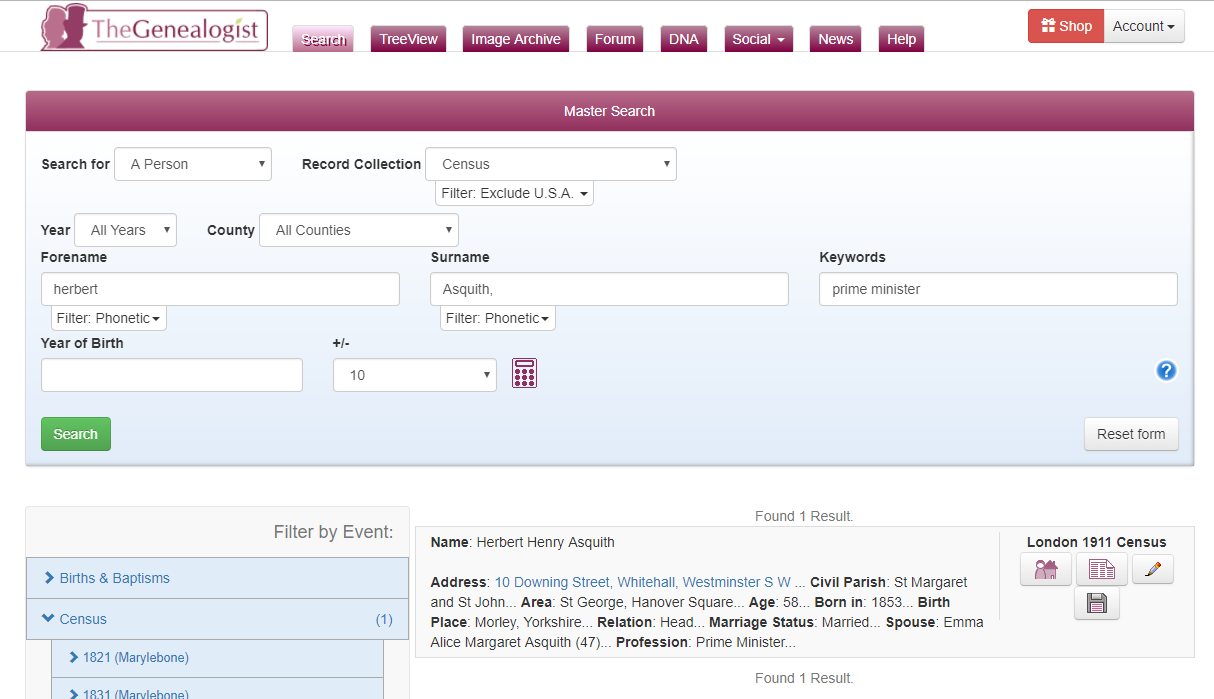
Start your search at www.thegenealogist.co.uk. We are looking for Herbert Henry Asquith, the liberal politician who at the time of the 1911 census was the Prime Minister
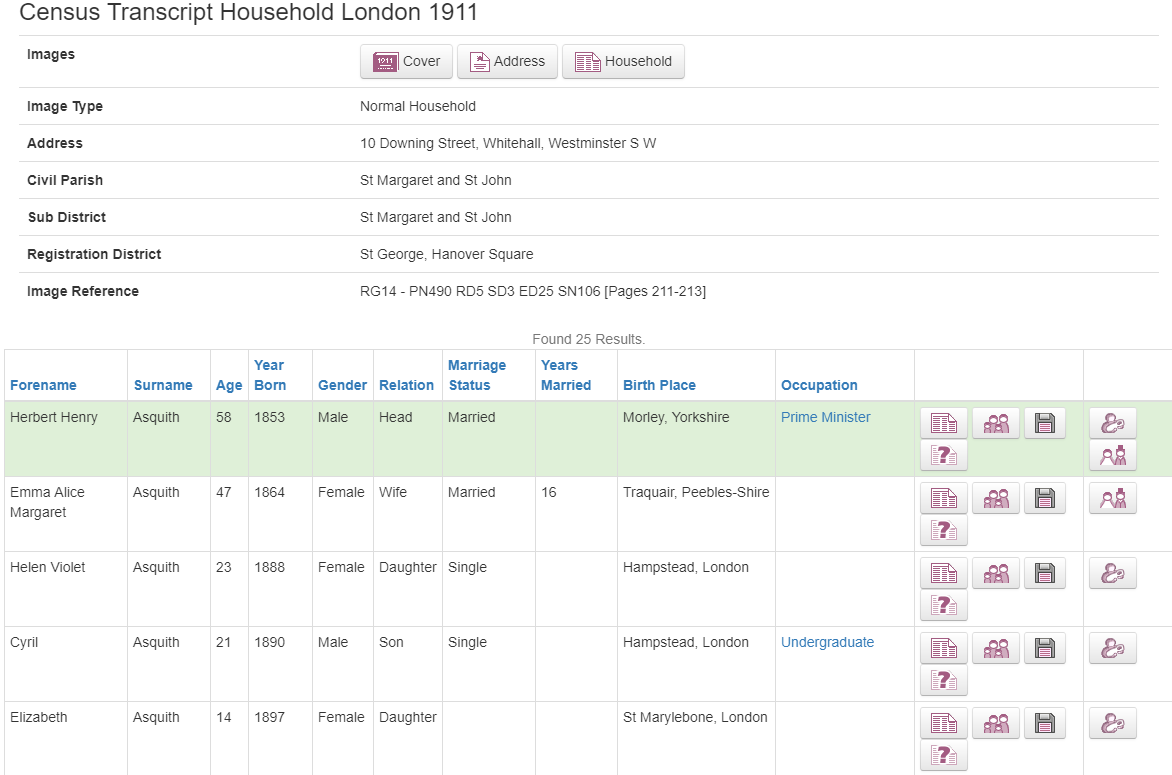
From the Master Search we have selected ‘A person’ from within ‘Census’ and the year 1911. You can filter by county, in this case ‘London’, and use the occupation 'Prime Minister’ as Keyword. The icons bring up the transcription (above) and the original document shown below
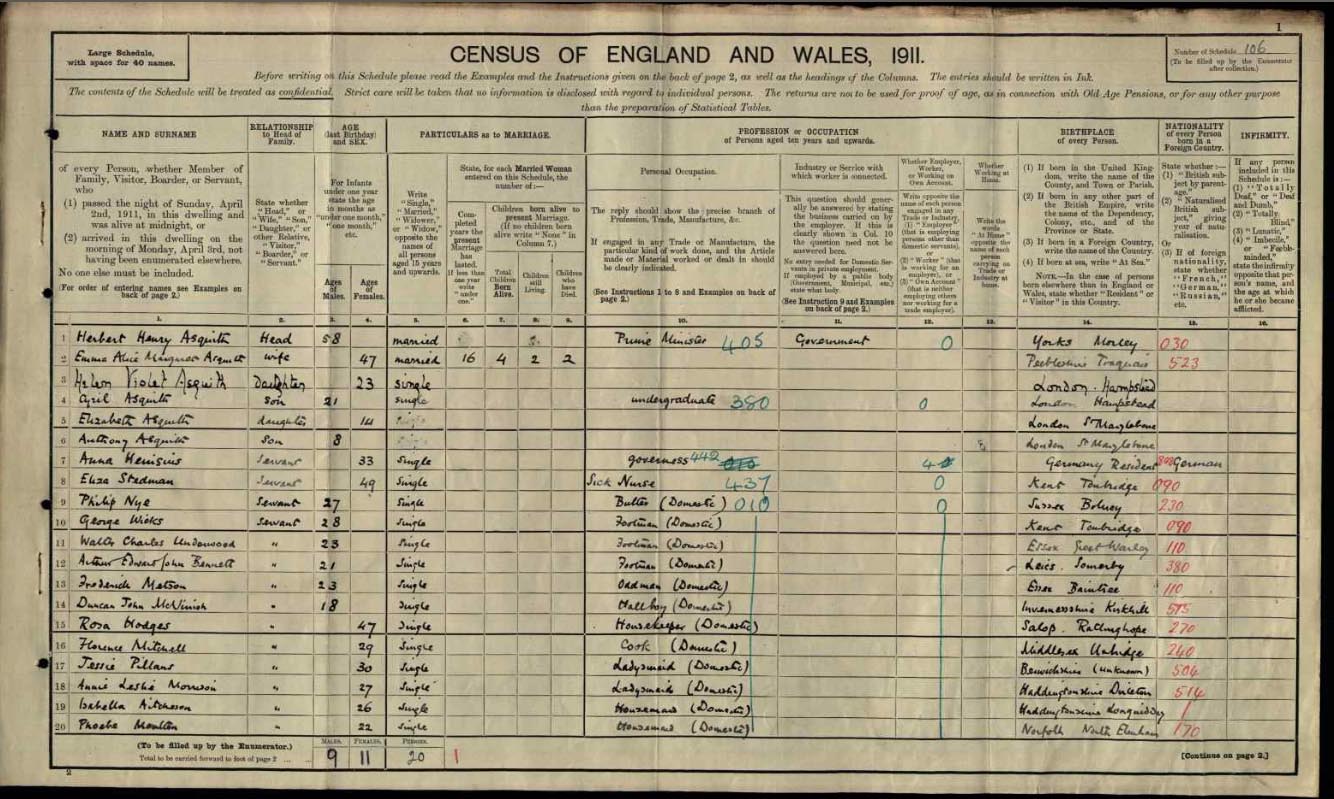
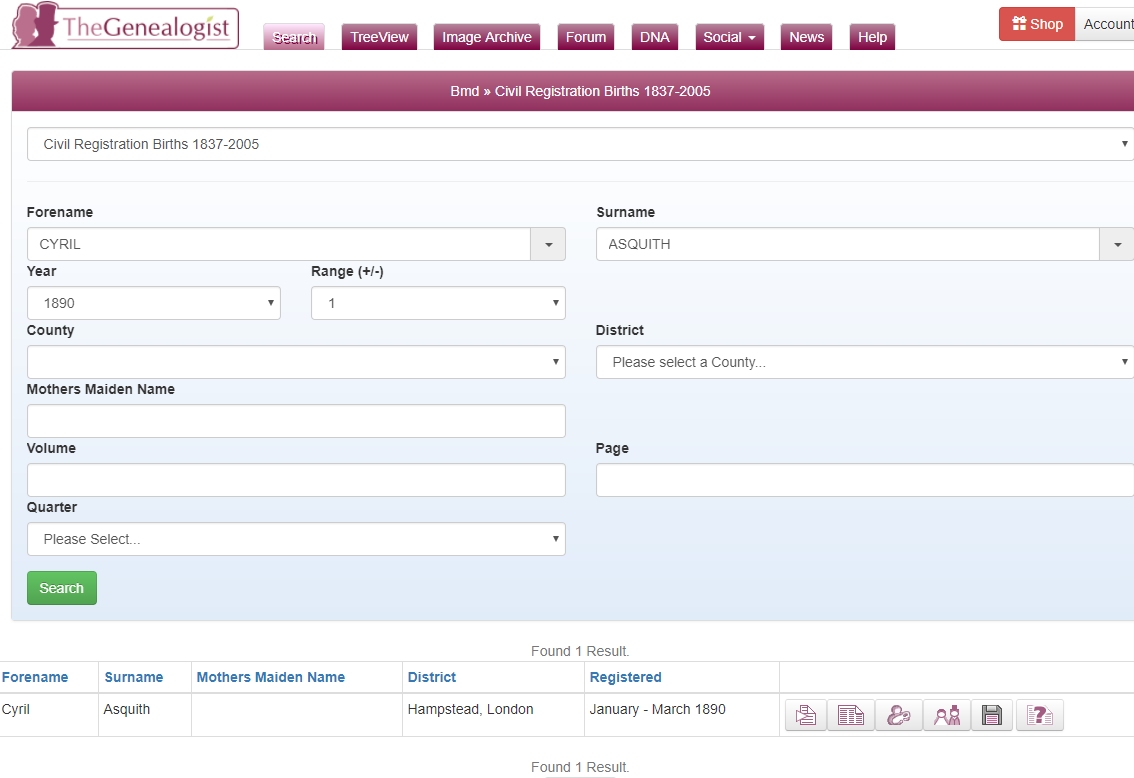
From the transcript page one click on the Potential Birth icon will use the powerful SmartSearch to look for likely births of the Asquith’s children.
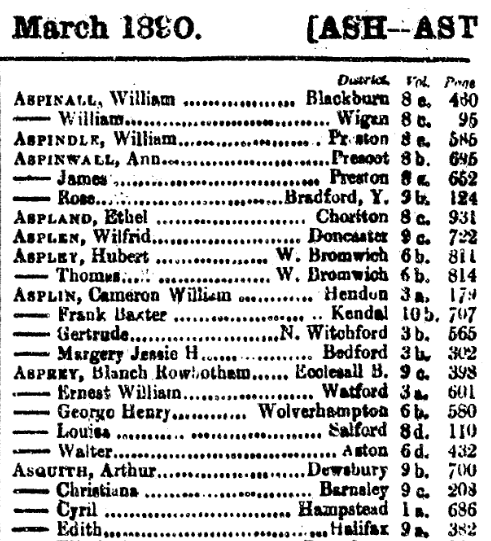
From these results you can click through to see the relevant General Register Office records for births and then order a copy of the birth certificate from the GRO from the details revealed